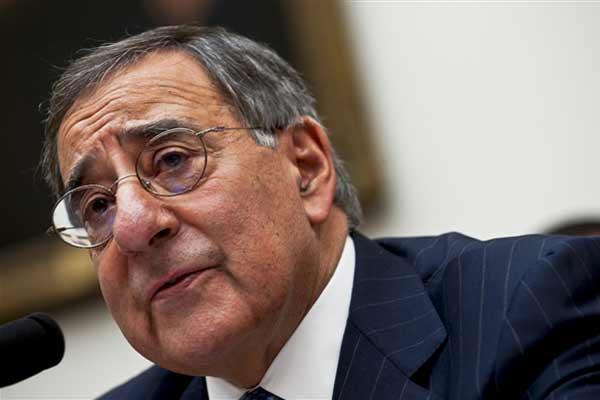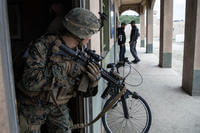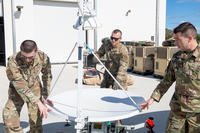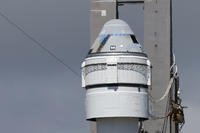Defense Secretary Leon Panetta opened the bidding Wednesday for a deal on Pentagon spending with the coming lameduck session of Congress and beyond that would clear the decks for President Obama to pick a successor from a growing list of potential candidates.
Panetta said that the military had stayed focused on its mission during the debates between Obama and former Gov. Mitt Romney on strategy, policy and budgets for defense.
"Now that the campaign is over," Panetta said in his message, "America's leaders, in turn, now have the responsibility to do everything possible to ensure that we succeed in our mission."
Panetta's immediate focus was on the looming Jan. 2 deadline for $1.2 trillion in across-the-board cuts in federal spending under the sequester formula that could cut as much as $500 billion out of defense unless the White House and Congress can reach agreement on taxes and debt reduction.
Before the election, Republican leaders in Congress said that a deal in the lameduck was unlikely but House Speaker John Boehner (R-Ohio) signaled that a "bridging" mechanism might be found in the session that would move the Jan. 2 deadline back three months or more to allow the new Congress to make the final decisions.
Doing deals with Congress and cutting costs were the main reasons that Panetta, a former eight-term Democratic House member from California who also served as White House Budget Director, was brought to the Pentagon in the summer of 2011 from his post as CIA director. However, the 74-year-old Panetta has made clear that this will be his last rodeo before returning to his walnut farm in Monterrey, Calif., preferably before his 75th birthday in June.
According to several defense analysts, the two names that pop up the most in the handicapping on the next defense secretary are those of Ashton Carter, currently Panetta's deputy, and Michelle Flournoy, the former undersecretary of Defense for Policy who was the highest-ranking woman ever to serve in the Pentagon.
But the list of possible choices for Obama will be much longer. Panetta's name was only one on a list of 15 given to Obama by National Security Adviser Thomas Donilon in picking a successor to Defense Secretary Robert Gates.
In addition to Flournoy and Carter, Sens. Carl Levin (D-Mich.), chairman of the Armed Services Committee, Jack Reed (D-R.I.), a senior member of Armed Services and West Point graduate, and former Sen. Sam Nunn (D-Ga.) were expected to get consideration.
Several Republicans were also on the short list, including retired Gen. Colin Powell, the former Secretary of State, and former Sen. Chuck Hagel (R-Neb.), currently chairman of the Atlantic Council. Another possibility was retiring Sen. Olympia Snowe (R-Me.), a member of the Senate Armed Services Committee who was leaving after 34 years in Congress.
Carter, 58, who earned a doctorate in theoretical physics, has been taking on a higher profile as Deputy Secretary of Defense and is considered the favorite inside the Pentagon to succeed Panetta. He previously served as Under Secretary of Defense for Acquisition, Technology and Logistics.
To bolster his policy credentials, Carter on Thursday will give a keynote address to the World Affairs Council on "Six Top Issues – U.S. National Security: Opportunities and Challenges for 2013."
"Carter is a perfectly sound, viable possibility" to replace Panetta, said Michael O'Hanlon, a senior fellow with the 21st Century Defense Initiative at the Brookings Institution, but his support within the Pentagon may not matter to Obama.
"Who cares what the damned building thinks? It's just not how it works" in choosing a Defense Secretary, and particularly for a president in his second term who has fewer concerns about how it might play in the polls, O'Hanlon said.
Flournoy, 51, a former president of the Center for a New American Security think tank, left her policy post at the Pentagon last February, but was active in support of Obama during the campaign on the talk show and lecture circuit.
"I do not see Michelle as a contender" to succeed Panetta, said Loren Thompson, chief operating officer of the Lexington Institute and a Pentagon consultant. Thompson said her expertise was on the policy side, and not on the nuts-and-bolts of procurement and personnel, but Obama may decide to break the glass ceiling at the Pentagon by nominating the first woman defense secretary.
The new defense secretary will take on the responsibility of carrying out a new military strategy under spending priorities begun by Panetta.
"It's been a transition phase" for the Department under Panetta from the era of ever-expanding budgets and two major ground wars, said Barry Pavel, director of the Brent Scowcroft Center for International Security at the Atlantic Council.
"The broad strategic arc is there" to follow in the Pentagon's shift away from Europe and the Mideast to focus on the Pacific region and the rise of China, Pavel said.
"The shift to Asia is dramatic," said Pavel, who served in the Pentagon's policy officer for 18 years. "If the 20th Century was the trans-Atlantic century, then the 21st is the trans-Pacific century."
But the nuclear showdown with Iran, the civil war in Syria, and the turmoil in the Mideast could interfere with the planned Pacific pivot, Pavel said.
"The inbox is going to be piled high with the Mideast" for Obama's second term, Pavel said. The focus on the Mideast could delay the Pacific shift for the military "or it could preclude it completely," Pavel said.


























